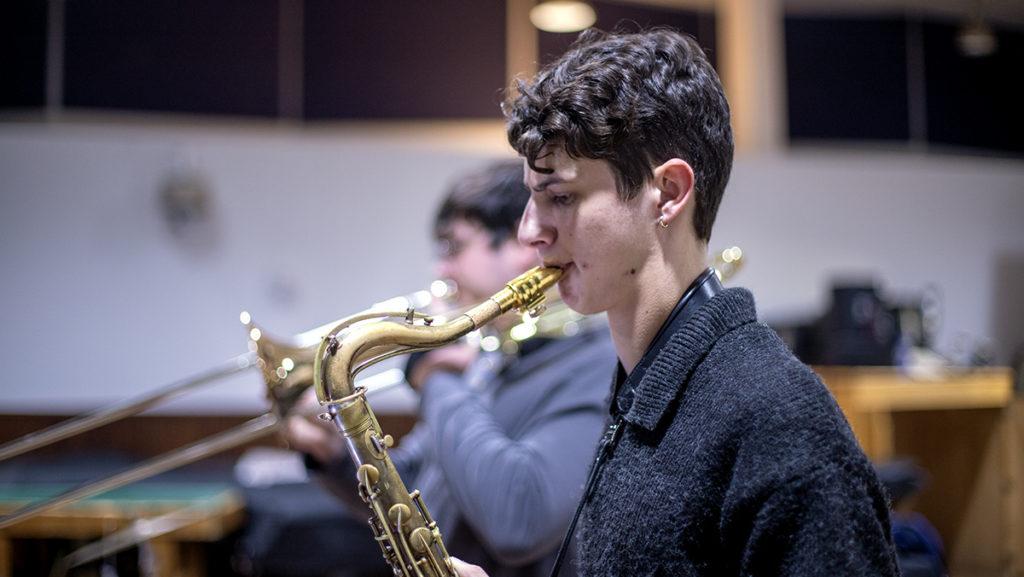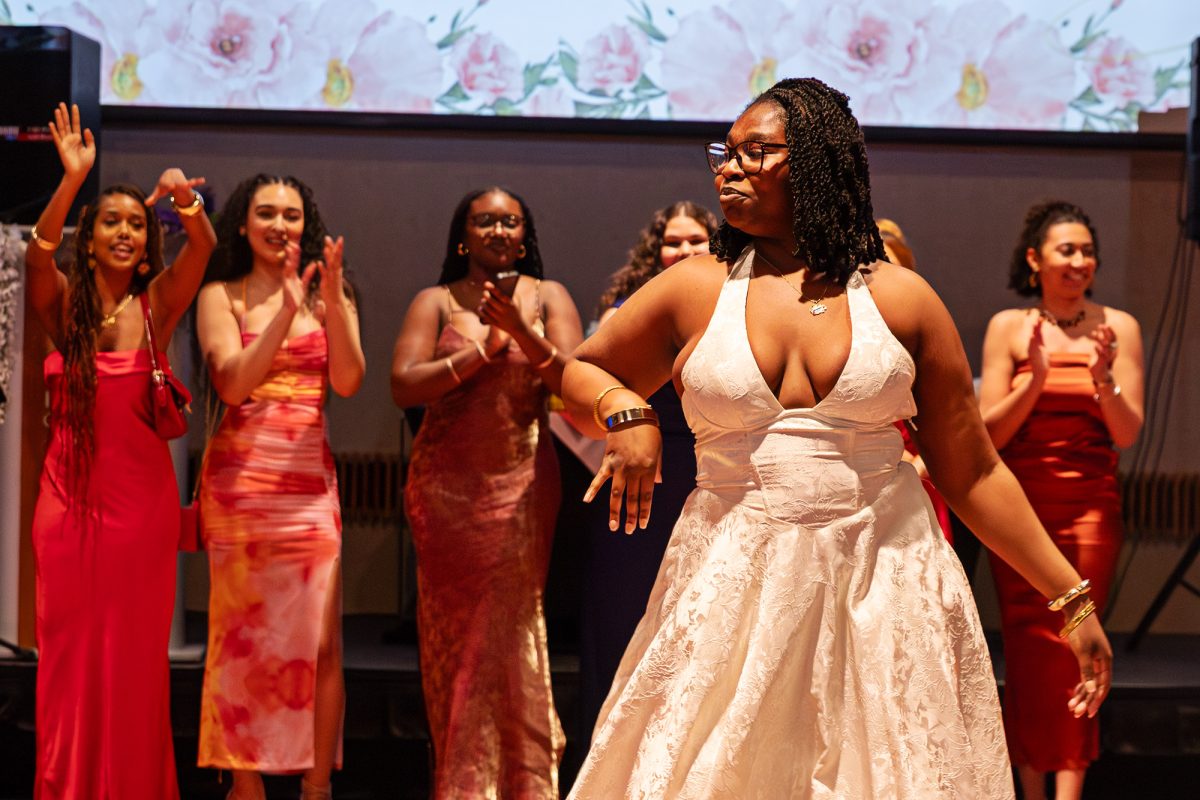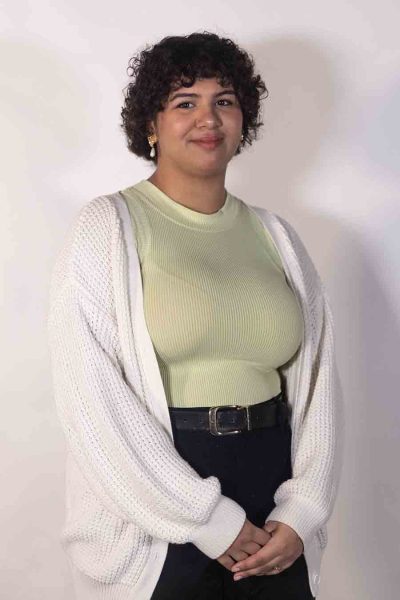Walking through the James J. Whalen Center for Music, one can be greeted by a harmonious blend of instruments and vocals. In the evening, however, a group of students occupy the Brown Family Jazz Chamber Music Room, tied together by one thing: jazz.
Swaying in equilibrium between slow tunes and upbeat tempos, the Ithaca College Jazz Club hosts Jazz Jam sessions every Thursday night at 9 p.m. Students of all musical backgrounds can take part in a unique opportunity for music makers and enthusiasts to enjoy an evening of bop, swing and funk.>
The club’s activities were not always confined to a small room in Whalen, however. In a previous iteration, the Jazz Club performed at Towers Eatery, formerly known as Towers Marketplace. COVID-19 restrictions put a hold on the club’s public performances, leading the sessions to resume on a smaller scale.
Leading the club is a tradition passed down from senior to senior. For the 2022–23 academic year, senior Drew Martin has taken up the mantle of leading the group. While he said his parents played a large part in nurturing his love of the genre, Martin said jazz has always been a love of his — influenced by saxophonists Dexter Gordon and Sonny Rollins, as well as participating in jazz programs like Jazz at Lincoln Center.
Part of the charm of Jazz Jams, Martin said, was to reintroduce people to jazz as a versatile genre. According to the National Museum of American History, the genre took the early 20th century by storm in the United States — blending ragtime, marches and blues with the multiculturalism of New Orleans to create a new sound altogether. From there, jazz developed a variety of sub-styles, including bebop, cool jazz and hard bop.
“I don’t get upset, I just … laugh because it’s like you have an undiscovered passion for jazz, you just haven’t found it yet,” Martin said. “Or you haven’t realized that it’s actually really cool. Many people don’t realize that a lot of the music that we listen to now was influenced by jazz.”
Jazz music also plays an important role in Black culture, with many early jazz songs serving as outlets for Black voices during the Civil Rights Movement. According to the Civil Rights Museum, many Black artists used jazz to build community and self-expression. Among these, Nina Simone’s “Mississippi Goddam” served as a response to the 1963 murder of activist Medgar Evers, Duke Ellington composed instrumental pieces that evoked the emotions of the Black freedom struggle and Ella Fitzgerald honored Martin Luther King Jr. with her single “He Has A Dream.”
Students participating in Jazz Jams are offered a collaborative environment to explore jazz they want to explore, Martin said.
“I’d say it’s a big part of my growth here only because you kind of learn what works with people, what doesn’t, what to play and what not to play,” Martin said. “And it really helps you test run a lot of things you might have been working on, and also shows you what you might be lacking for other players.”
For an hour, students are able to play any assortment of jazz standards, a catalog of songs commonly played in jazz. In many instances, the songs have not been rehearsed prior to the jam session, but rather allow the musicians free reign to jump in and play or sing whatever they are comfortable with. The collaborative nature of the sessions is what first-year student Grace Gonoud said drew her to Jazz Jams initially. As a music education major, Gonoud said the club offers her an opportunity to try out as many instruments during the jam sessions as possible — anything from clarinet to saxophone.
“Everyone is super, super supportive,” Gonoud said. “That’s something I really like about it. Even if you are just starting out on your instrument [and] you’re like, ‘Hey, I kind of like jazz. I want to come and play.’ It’s a really great spot to do that. And it doesn’t matter what level you’re at. You could be a near professional … or just starting out freshman like me, and either way, it’s, like, super fun. There’s a space for you.”
First-year student Mathew Hastava, a music education major, similarly said he was drawn to the club by how freeing the experience of playing music on his saxophone with others was.
“The cool thing about jazz is that when we go in there, nothing is planned,” Hastava said. “[You] just feel a connection and you just go with the vibe.”
Sophomore Zachary Neidhardt takes up the role of the drummer during the jam sessions. As a sound recording technology major, he said he views Jazz Jams as an outlet to engage with the music scene in Ithaca following the COVID-19 pandemic.
“I think the music scene in jazz and everything else is very much coming alive,” Neidhardt said. “And that’s really exciting to see, because it’s what we were promised, you know, going to school here. Like a vibrant music scene, and now post [COVID-19], she’s finally coming out, coming back and showing [herself].”
Deep passion and understanding of the music are not only felt among the club’s participants. Junior Sarah Flynn said she often comes to listen in on the jazz sessions but does not actively participate in them. For Flynn, she said that the experience of being an audience member at Jazz Jams is often more freeing than being an audience member at a more classical performance.
“Being an audience member there is very different from being an audience member at a wind ensemble concert or something,” Flynn said. “They’re very open to applause after solos and cheering on and everything. So it’s just really, really casual and really fun.”
Classical music culture is very prevalent in music society. Yet, according to the New York Times, the percentage of people attending classical music performances is on the decline — with only 8.6% of adults attending concerts. Extensive concert etiquette for classical music performances pose another barrier to attendance, with rules on how to dress, when to arrive and when to applaud. Jazz concerts, on the other hand, are experiencing record attendance. According to Secret New Orleans, the city’s 2022 Jazz Fest saw an uptick of 475,000 attendees — bouncing back up to pre-COVID-19 attendance levels despite being canceled in 2020 and 2021.
“I think as a music major, it’s really nice to see non-music majors participating and experiencing music especially,” Flynn said. “I feel like nowadays they think that music isn’t a very good career. … It’s nice to have something where everyone can enjoy music because that’s really what it’s all about here, is sharing music with everyone.”
Another goal of Jazz Jams is to move away from the rigid nature of performance and allow its participants freedom. Part of that, Neidhardt said, was allowing everyone to play — regardless of major or musical background.
“Whalen sometimes makes it very challenging for people who aren’t within the music school to make music,” Neidhardt said. “I want to see that change desperately because some of the best musicians I know aren’t a part of the school. That’s why I think this club is doing something great.”
The idea that music is for everyone is something that Gonoud said she personally agreed with. With Jazz Jams, Gonoud said she hopes the jam sessions will become a space for those to become comfortable in their playing.
“You don’t have to be a music major,” Gonoud said. “You don’t have to be a jazz major. I think as long as you like jazz, even if you want to just listen, everyone is welcome. And even if you aren’t the most confident in your playing, this is a great space to get confident. Because you don’t have to sound perfect right away.”
Martin similarly said he would encourage those who might be curious about the sessions or want to learn more about jazz to show up and listen.
“[Jazz Jams] is for absolutely anybody at any experience level,” Martin said. “If people want to learn more about jazz, they can come in and ask questions. If people just want to hang out and listen, we’re also open to that.”
As the musicians pack up at the end of each jam session with the last notes still lingering in the air, students walk out of the room just a little closer to one another — which Neidhardt said reinforces the idea that the club, jazz and music as a whole are for everyone.
“Music is music and what I think upsets me sometimes is like, the exclusive exclusivity of certain musical clicks,” Neidhardt said. “I think everyone should get to play. If you know how to play an instrument then come play because I think there’s no greater joy than just making music with people.”















